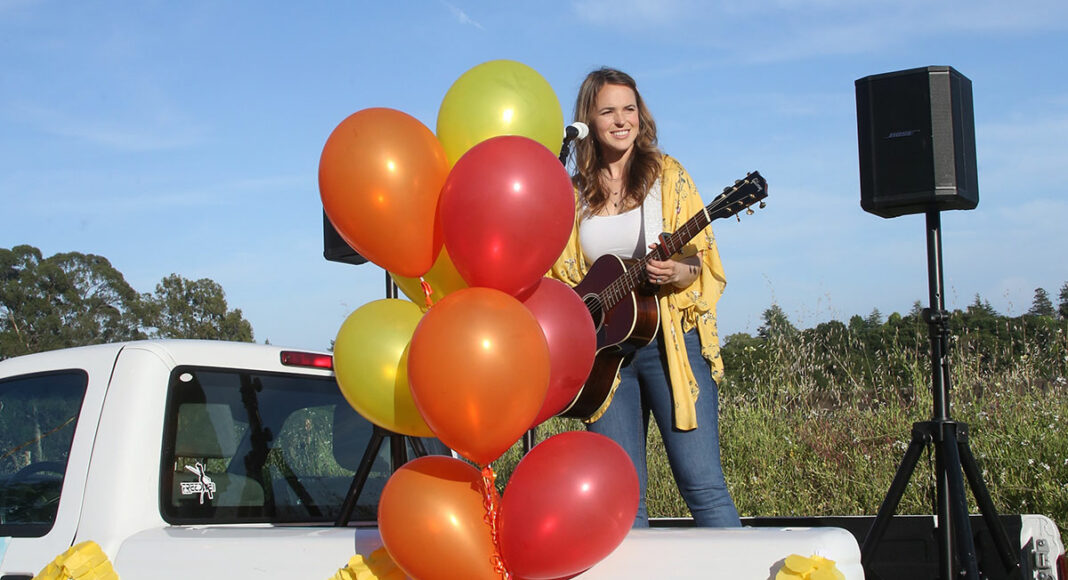Last month, legendary concert promoter John Scher—who produced two Woodstock festivals, a string of Bruce Springsteen’s most famous shows, and the 1977 Grateful Dead performance at Raceway Park that drew 125,000 people and was New Jersey’s biggest concert ever—predicted to nj.com that live music as we know it will not return until 2021.
John Scher never met Mira Goto.
Santa Cruz singer-songwriter Goto was primed for a big break this year, with a tour planned that would show Music City, USA (aka Nashville, where she now lives part time) exactly why critics and fans out West are so drawn to her California country sound. Then, of course, the coronavirus hit, and like every other musician, she had all her shows cancelled.
“It was my launch year, and it just totally got shot down,” Goto says. “My whole career suddenly was, ‘Nope, nothing’s happening right now.’”
She did the livestreaming thing right away, but so did everybody else. Very quickly, however, she hit on an idea that nobody else was doing. It came to her after she showed up at her parent’s house to play for them on their front porch. Someone who saw that performance asked if she would play in their driveway. She realized she had battery-operated speakers and the rest of the equipment she’d need. So on March 26, she played her first live show from the back of a pickup truck, livestreaming it at the same time.
“I thought I could probably turn this into a thing,” Goto says. And she has, with the bookings coming in regularly despite the fact that she was only advertising it on social media. “Now I’m starting to get inquiries about entire neighborhoods,” she says.
She plays a lot of the small birthday, graduation and wedding celebrations that can otherwise be a little underwhelming in a time of quarantining. Though the concept recalls the early days of rock and rockabilly, when Jerry Lee Lewis was known to play in the back of a truck himself, Goto says she wasn’t really thinking about that connection.
“It was more like, ‘People are still celebrating in quarantine, and live music makes things a little more special,’” she says.
She does observe all social distancing regulations and expects her audience to as well—getting, for instance, no closer than six feet to the truck. Sometimes her husband Anthony performs with her, in which case “we have to sit the guitars on his lap when I’m driving.”
It’s a good thing Goto’s out there, because the other prospects for live music this summer look dismal indeed. None of the club owners and promoters I talked to said they really expect Santa Cruz County to reach the state’s mythical “stage four” of Covid-19 recovery this year—and even then, say some, live music may be longer still in coming.
“We know we’re going to be the last type of business that’s allowed to open,” Tim Jackson, Kuumbwa co-founder and artistic director, tells GT of live music venues. In a letter to the community on Friday, Jackson wrote that Kuumbwa “will likely remain closed through most of the summer. When we do re-open, attending an event at our venue will be quite different, as we modify our operations to address public health concerns.”
That last sentence raises an important question: When live music venues do return at limited capacity, will promoters even be able to sell enough tickets to justify bringing in the artists? And the answer, of course, is that no one yet knows.
If the future of the small but mighty Kuumbwa is unclear, imagine what it’s like for a venue several times its size. Booker Thomas Cussins of Ineffable Music Group says there is “no update at all” right now about the Catalyst, although another Ineffable property, Felton Music Hall, is at least reopening for dining on June 12. Felton Music Hall has also hosted artists on its stage for livestreamed shows with no audience, such as Chris Rene and the Expendables, and Cussins says they’d like to do more.
“We’re taking very small baby steps,” he says.
The Rio is also a large music venue, but owner Laurence Bedford is taking it back to its roots. “The concerts are not happening anytime soon,” he says, “so we’re a movie theater now.” Indeed, while it will eventually return to music shows, the Rio has been producing a “Virtual Cinema” series online that features the kind of new releases that streaming services like Netflix aren’t providing.
“We’re showing things that are not available anywhere else at the moment,” says Bedford. For instance, now showing is the indie film Tommaso, which re-teams star Willem Dafoe with cult director Abel Ferrara (of The Addiction, The Funeral and Bad Lieutenant fame). Virtual cinema films are $12 and can be viewed for five days.
Ironically, this summer marks 20 years since Bedford reopened the former movie theater as a music venue.
“It’s kind of eerie,” he says, “that 20 years later, we’re reinventing ourselves yet again.”
Read our full summer preview coverage.















How can I get a physical copy of this edition of Good Times? I live in San Jose.
Thanks for your note! Please email ka**@go*******.sc if you’d like a print edition mailed to you. If you are looking for a place to pick up a print copy, we have a list of distribution locations here: https://goodtimes.sc/good-times-print-locations/